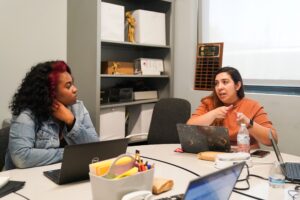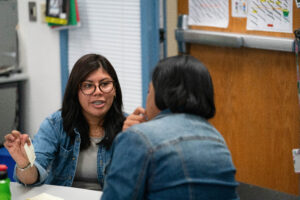In my first job out of law school, I started at the bottom of the totem pole. I spent a lot of time in the library researching legal issues for more senior lawyers, prepared documents for depositions and court hearings, and watched more experienced colleagues in action. As my career progressed, I earned more responsibility, eventually managing junior associates as they learned their craft. But as I took on new responsibilities, I shed others. I still knew how to conduct legal research and did it myself on occasion, but it was no longer my core responsibility. By the time I was a trial attorney myself, I was leading teams of other lawyers, paralegals and experts, all with defined roles on the team.
My experience was no different than that of new doctors, accountants or engineers. They all start with relatively straightforward work and then, if they’re successful, move on to more complex and expansive responsibilities with higher stakes, eventually managing teams toward outcomes. Their graduate school experience provides a grounding in the subject matter, but it’s usually not necessary for professionals to enter the field ready to do everything. They learn the practicalities on the job.
There are at least two reasons for this career progression. The first is developmental. As a lawyer, before you represent a client at a trial, it’s helpful to have assisted a more experienced trial lawyer and had a chance to practice the skills you’ll need to be a competent trial attorney. Second, the job of a lawyer is multifaceted. It requires very different skills and talents. The lawyer who is exceptional at researching and writing briefs may not be as good at oral argument or cross examination. Very few are great at all aspects of the job, nor are they required to be. Requiring such a thing would dramatically narrow the field of who could be successful and force everyone early in their careers to be single-faceted generalists. This career progression acknowledges that a lawyer is part of a broader team that works together to achieve positive outcomes for clients.
For teachers, the experience and expectations are very different. Instead of starting with lower-stakes tasks and expanding their responsibilities gradually, from day one teachers are expected to do it all. If they’re lucky, they’ve had a brief opportunity to student teach or teach in summer school before taking over their own classroom. And teaching is every bit as complex and challenging as other professions. Great teachers do much more than engage students during class time. They are great lesson planners; they are experts at identifying challenging content for their students; they analyze data to understand student progress; they know how to design assessments that reveal whether students have mastered material; they are adept at keeping families informed and invested in their children’s education; they use lessons from developmental psychology to establish personal connections with even the most challenging students; and on and on.
The fact that teachers are asked to excel in all these areas from day one without a support team is a very old and frustrating story. Proposed solutions to this problem abound, but the question that almost never gets asked is whether it’s realistic to think we can ever find or develop millions of teachers who are great at all the many aspects of teaching.
There could be another way. Imagine a school where the teacher’s responsibility is exactly what we think it should be: ensuring that all students get what they need to succeed. And instead of having to do everything themselves to make that happen, like other professionals, they manage a team: a lesson planner, a curator of content, a parent engagement specialist, a data analyst, an assessment designer, a special ed compliance specialist, maybe even a homework grader. Such a structure would serve multiple purposes. First, it would allow teachers to focus on their core responsibility. Teachers could spend the bulk of their time formulating and executing instructional strategies designed to meet individual student needs, while delegating tasks like completing paperwork or planning individual lessons that may not be as critical.
This approach would also create a real career pathway toward teaching, open to a diverse range of aspiring educators. Someone right out of college with a degree in economics might be perfectly capable of analyzing student data; someone with experience running a small business might be a perfect parent engagement specialist. And while these specialists are working in entry-level positions, they will have the opportunity to learn the craft from a master professional—the teacher—who is the leader of the team and is responsible for ensuring the ultimate outcome: student success. Just as importantly, this model would help to enhance the prestige of the teaching profession. Instead of an entry-level job, it could be the culmination of someone’s career, involving responsibility for managing a large team.
Some experts are already working on new school models that resemble this one. Just last week, we wrote about innovative blended learning models that are introducing differentiated teacher roles in some schools. The threshold questions are about cost. Won’t hiring all these specialists break the bank? Not necessarily. These are entry-level positions with entry-level pay, not designed as long-term positions. And with such a support team and smart use of technology, individual teachers should be able to work with many more students than they can right now without any help.
There are a lot of details about this approach that need to be ironed out—and we need to start innovating in real schools and classrooms to figure out what works and what doesn’t—but I think it’s an idea that is long overdue. It seems like a better bet than continuing to ask teachers to do it all from day one.








